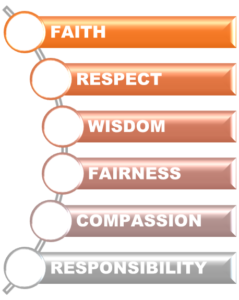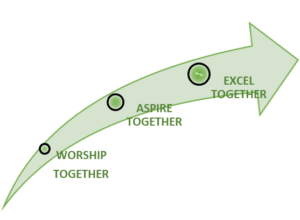OUR ENGLISH MARTYRS’ SCHOOL CURRICULUM

Here at English Martyrs’ Primary school we believe that our pupils deserve to receive the best education possible based on a comprehensive, holistic and relevant curriculum that will prepare them for the next stage of their educational journey and for life as adults in which they feel fulfilled and able to contribute as mature citizens with courage and confidence.
Our school curriculum is driven by the concepts and beliefs as outlined in our school’s Mission Statement, the School Values and the School Motto:
MISSION STATEMENT
Our English Martyrs’ School community aims to follow the example of Christ, in welcoming, recognising, fostering and developing each individual, as a unique and special gift from God with value and dignity.

SCHOOL VALUES
Our six school values are a vital part of our ethos and underpin our vision and the way we work together as a school community.
These school values are rooted in Christian teaching and tradition; they complement the British Values and are the qualities that inspire our high standards of behaviour and relationships within the school and beyond.
Although we aim to practise our core values throughout the whole year we also focus on one chosen value each half term as shown in the table below.
VIRTUES
We also aim to build on our school values to work towards and practise other Christian virtues and to show examples of the Fruits of the Spirit in our daily lives, teaching and learning and everything we do within our school community and beyond.

 THE ENGLISH MARTYRS
THE ENGLISH MARTYRS
The English Martyrs’ themselves, whom the school is named after were prominent examples of our values and virtues that are drawn from them. Some of our classes are also named after these special saints. Children also learn about their witnessing and try to look at them as Christian role models.
 SCHOOL MOTTO
SCHOOL MOTTO
Our Motto embodies and explains what we aim to achieve as a school community. School leaders, all members of the school staff and parents strive to and are driven by their commitment to Aspire together, Achieve together and as a Christian community Worship together.
CURRICULUM
‘At the very heart of education sits the vast accumulated wealth of human knowledge and what we choose to impart to the next generation: the curriculum. Without curriculum, a building full of teachers, leaders and pupils is not a school. Without receiving knowledge, pupils have learned nothing and no progress has been made.’
Amanda Spielman
Our English Martyrs’ school curriculum therefore aims to make learning practical while at the same time engaging and stimulating for all pupils. Using the 2014 National Curriculum as the first basis of our teaching, our pupils are taught through a carefully planned and systematic programme that ensures that each pupil receives all the necessary components needed to be able to achieve and make good and better progress at each step of the journey.
 All National Curriculum core and foundation subjects form an intrinsic part of our school curriculum. While having Reading, Writing, Numeracy, Religious Education and Science at the core of all the learning, all other Foundation subjects are not only taught discretely, but are also connected to work through topics which make the most of cross curricular links with other subject areas.
All National Curriculum core and foundation subjects form an intrinsic part of our school curriculum. While having Reading, Writing, Numeracy, Religious Education and Science at the core of all the learning, all other Foundation subjects are not only taught discretely, but are also connected to work through topics which make the most of cross curricular links with other subject areas.
What is not up for debate, however, is that great schools are identifiable by the clarity of their curriculum vision. All great schools have an inspirational, rigorous and carefully planned curriculum. It is one of the key pillars and contributes to the lived experience of every single child within a school.
David Woods
Whereas weaker schools may demonstrate curriculum dependency, looking to the government or examination boards to set the framework for what they teach, great schools do not stick slavishly to the national curriculum – rather, they are innovative, imaginative and creative in their approach to designing their own bespoke educational provision.
They are able to meet the needs of the accountability framework whilst at the same time having the courage and determination to be ‘innovative according to their values and beliefs as school leaders, coupled with their confidence and capacity for breaking the mould’
(Greany and Waterhouse, 2017)
At the same time we aim to deliver the National curriculum in a way we see fit for our pupils at English Martyrs’. We therefore always take into consideration factors such as our local area where our pupils come from, the family background and experience of families they come from as well as current affairs that impact on the lives of our pupils.
Embedded in all teaching is a system of structured and meaningful progression together with challenging activities designed to build confidence and inspire children to continue to make sustained progress and nurture a life-long passion for learning.
English, Maths and some other core subject lessons normally take place in the morning, while other foundation subjects are normally taught in the afternoons.
The curriculum is everything that happens to a learner in school. It is not only the subject matter of lessons; it is the whole school experience, including what happens in lunchtime and breaks, extracurricular activities and school visits…
John Dunford – 2016
Throughout the year we aim to plan curriculum enrichment activities in a number of ways including:
- Themed weeks, such as Maths Week, Book Week, Arts Week and others. These allow children to develop their skills in a more focused way.
- Local, national and global themes – learning about relevant issues beyond what is in the National Curriculum such as local area history, global themes such as the environment and poverty in the world and similar themes.
- Educational visits – visits to museums, galleries, places of worship and other landmarks in London and beyond to reinforce the learning that takes place in the classroom.
- Visitors to school: These include educational and other visits such as speakers from Charities we support from time to time; the Teddy Bear Hospital for Reception and Year 1 children, Drama workshops for children in different year groups and others.
- Use of outdoor learning as a stimulus, eg. Use of the school Garden and grounds, the Nursery and Reception outdoor area and other spaces in the local area.
- We also welcome parents and others who volunteer to help out in different ways at different times of the school year.
- Extra-curricular provision: Children are encouraged to take part in other extra-curricular activities such as Sports Clubs, Singing, Drama, Arts and Crafts, Languages etc
